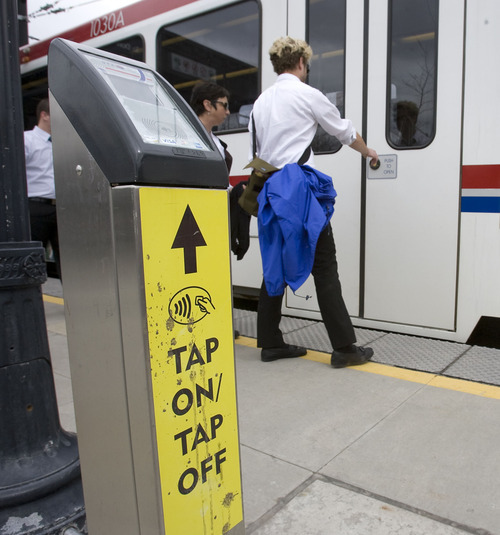This is an archived article that was published on sltrib.com in 2011, and information in the article may be outdated. It is provided only for personal research purposes and may not be reprinted.
Three of the nation's biggest wireless carriers said Tuesday they are launching a system of mobile payments by phone in the Salt Lake City metro area with plans to roll it out to the rest of the nation after a pilot period here.
Isis, a joint venture of AT&T Mobility, T-Mobile USA and Verizon Wireless, said the program will debut in early to mid-2012 on the Utah Transit Authority's system, allowing riders to pay fares with their mobile phones. The company also will recruit local phone users and merchants to start using the system.
Isis was formed in November 2010, and CEO Michael Abbott said it then looked at more than 50 areas where it could operate a program.
"Salt Lake City rose right to the top of the list for a number of reasons," Abbott said Tuesday, citing "perfect demographics, a young population willing to adapt, willing to try, and incredibly well-educated. We knew if we could get the message out we could make it work."
He also cited a friendly business environment and the presence of the UTA, which since January 2009 has had "near-field communication" terminals on all buses and light-rail stations that allow passengers to tap specially equipped credit cards to pay fares.
"We looked around the globe for other successful pilots, like in Japan and Korea, and one common theme we know we had to have was transit," Abbott said.
Frequency of use such as on a transit system was the key to adoption, and only UTA had such a complete system in the United States, he said.
Clair Fiet, UTA's chief technology officer, said the agency went with the new payment system in 2009 because it would allow riders to use their credit cards instead of the agency having to issue cards of its own.
"Unfortunately there's not been a lot of penetration," he said. "There's not been a lot of banks and credit unions that issue those in this market."
UTA hopes that the Isis mobile phone system will facilitate "a huge uptick in the market," Fiet said.
Abbott said the consortium will use the Salt Lake pilot program to sharpen its marketing message to consumers and merchants before introducing the system elsewhere.
Consumers must be equipped with a phone with a near-field communication system in order to use the system for purchases. Some phones already have the system and some wireless companies are already making all their phones compatible, he said.
Many merchants also have terminals equipped to use the system, but Isis will have to convince others to get credit card swipe machines that also take mobile payments, he said. "We'll work with those merchants to get those upgraded."
Isis aims to work with banks and credit card companies so consumers can make purchases that either take money from an account or charge payments on a credit card.
The consortium is looking for ways to earn revenue from the system, such as allowing banks to communicate daily with customers about their accounts. Merchants also could offer coupons, discounts and loyalty cards over phones, he said.
Fiet said UTA will explore revenue streams, too, such as selling merchants along its routes access to customers so they can extend special offers and other information.
On Monday, Sprint said it plans to start a payment system this year ahead of Isis, according to Bloomberg News.
Gartner, a technology research firm, said last year that the number of mobile payment users worldwide will exceed 108.6 million in 2010, a 54.5 percent increase from 2009. Mobile payment users will represent 2.1 percent of all mobile users in 2010, it said in a report.
"We continue to see strong growth in developing markets in Asia, Eastern Europe, the Middle East and Africa for mobile payment, while adoption in North America and Western Europe lags behind due to the plentiful choices of payment instruments that consumers have," said Sandy Shen, research director at Gartner.
In developed markets such as the United States, she said, "the service needs to be built on top of the existing payment behavior and infrastructure so that users can choose any channel — retail, phone, online or mobile — that suits their context at the moment of payment."
Isis security
O Isis says its system will be secure. It said a mobile phone allows layers of security to be added to a payment, such as codes that change on every transaction and remote activation or deactivation of an account.
> paywithisis.com



